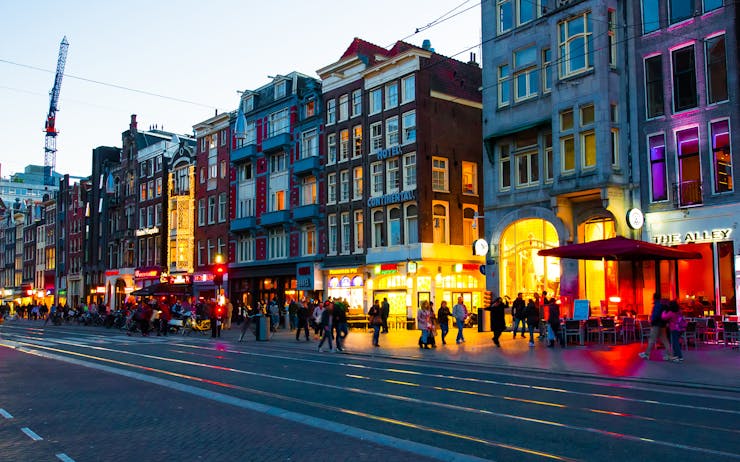Dutch Coffeeshops and Their ‘Backdoor Problem’

Without a doubt, the coffeeshop system has not been without its problems. There have been issues caused by large numbers of tourists traveling to coffeeshops, and many of the new restrictions were passed under pressure from neighboring countries. Cannabis tourism increased substantially in the border regions with Germany and Belgium, and so did the complaints about nuisance from local residents. Changes, such as the reduction in the maximum allowable amount for daily individual possession and purchase in coffeeshops, were in direct response to the increasing nuisance and aimed at discouraging cannabis tourists.
About a third of all visitors to Amsterdam visit a coffeeshop at some point.
Perhaps the most justifiable concern with the coffeeshop system is the backdoor problem. Significantly, the quirks of the system’s evolution have led to the paradox that while sales are de facto legalized, the coffeeshops are still supplied via an illegal production system. This has led to concerns about the links between coffeeshops and organized crime. In 2008, police sources were claiming that 80 percent of the marijuana cultivated in the Netherlands (“Nederwiet”) was grown for exportation. However, in 2012, investigative journalists got their hands on the KLPD report and demonstrated that the report in fact suggested there was very little proof in support of the previously cited numbers.
Not surprisingly, drug tourism represents a major element of the Dutch economy. Research in 2008 found that foreign visitors to the city of Maastricht’s coffeeshops spent money in other businesses there as well, roughly €140 million annually (or nearly $149 million USD). About a third of all visitors to Amsterdam visit a coffeeshop at some point; nationally, the number is one in five. Banning such visitors would hit tourism revenues hard.
Cities such as Maastricht, on the other hand, have banned foreigners from coffeeshops since 2005. The result has been a proliferation of street dealers. People still come from neighboring countries to buy marijuana, but now they purchase and head back home in a day instead of spending any time in local hotels and restaurants. It’s ironic, really, since the rate of marijuana use is almost twice as high in France as it is in the Netherlands, which has among the lowest number of drug-related deaths in Europe.
‘Towards a Safer Society’ or Too Tough a Crackdown?

Between 2002 and 2010, four cabinets created a particularly rough social-political debate around drugs, especially coffeeshops. The first Cabinet named its coalition agreement “Towards a Safer Society.” They expressed the intent to reduce the presence of coffeeshops in the vicinity of schools and border areas, as well as criminal involvement in the shops.
In 2004, the Ministries of Health, Justice, and Internal Affairs issued the “Cannabis Letter,” which re-emphasized the three pillars of Dutch drugs policy: the protection of health, combating nuisance, and fighting drug-related crime. It declared the intent to focus on reducing street trade, drug tourism, and professional cannabis cultivation.
The paper mentioned the possibility of “moving varieties with higher THC content onto List I of the Opium Act” if these were associated with increased health risks. Coffeeshop policy was further decentralized to the local authorities. The letter reiterated the desire to further reduce the already declining number of coffeeshops. Subsequently, the Promotion of Integrity Assessments by the Public Administration Act aimed to prevent coffeeshop permits going to owners with ties to criminal organizations.
In 2008, the Coordination Unit Assessment and Monitoring of New Drugs published an assessment of the risks associated with THC percentages in cannabis. The report concluded that combating organized crime and reducing cannabis-related nuisance were best achieved by regulating the supply side.
Local consumers refused to register for their passes at coffeeshops, fearing that their privacy would not be guaranteed.
The Van de Donk Committee, basing its conclusions on the Trimbos Institute report, concluded that the main aim of Dutch drug policy had been successful, as coffeeshops facilitated the separation of hard and soft drug markets. The committee expressed concern about the large, professionally organized coffeeshops and increased trafficking of drugs across the border. It believed it necessary that coffeeshops become small-scale establishments again, restricted to local residents and maintaining the separation of soft and hard drug markets.
In May 2012, the government introduced the weed pass (“wietpas”) on a pilot basis and two new criteria were added to AHOJ-G:
- B – Coffee shops needed to be small and closed
- I – Only local residents could visit
The results were not all positive. Nuisance related to illegal street sales increased. Local consumers refused to register for their passes at coffeeshops, fearing that their privacy would not be guaranteed. Opposition among local governments against the weed pass grew rapidly.
Shop highly rated dispensaries near you
Showing you dispensaries nearIn September 2012, a new coalition abolished the weed pass but insisted on restricting access to foreigners. The implementation of the residence criteria would be done in consultation with the municipalities concerned. Just four years later, most cities have abandoned the system, with only the city of Maastricht and a handful of smaller towns in the country’s southern region still enforcing the measure.
In Part 4 of our series exploring the rise of Dutch cannabis coffeeshops, we look to the future of the coffeshop, whether they can thrive in the United States, and the lessons we can learn from the Dutch coffeeshop system.





